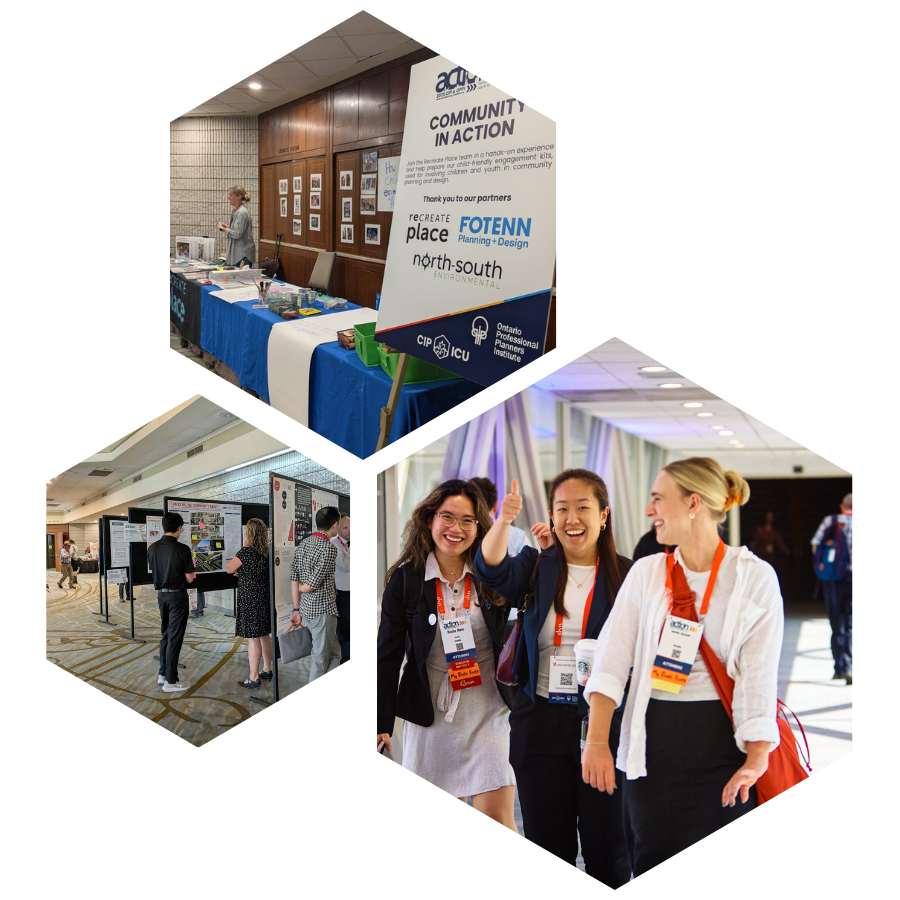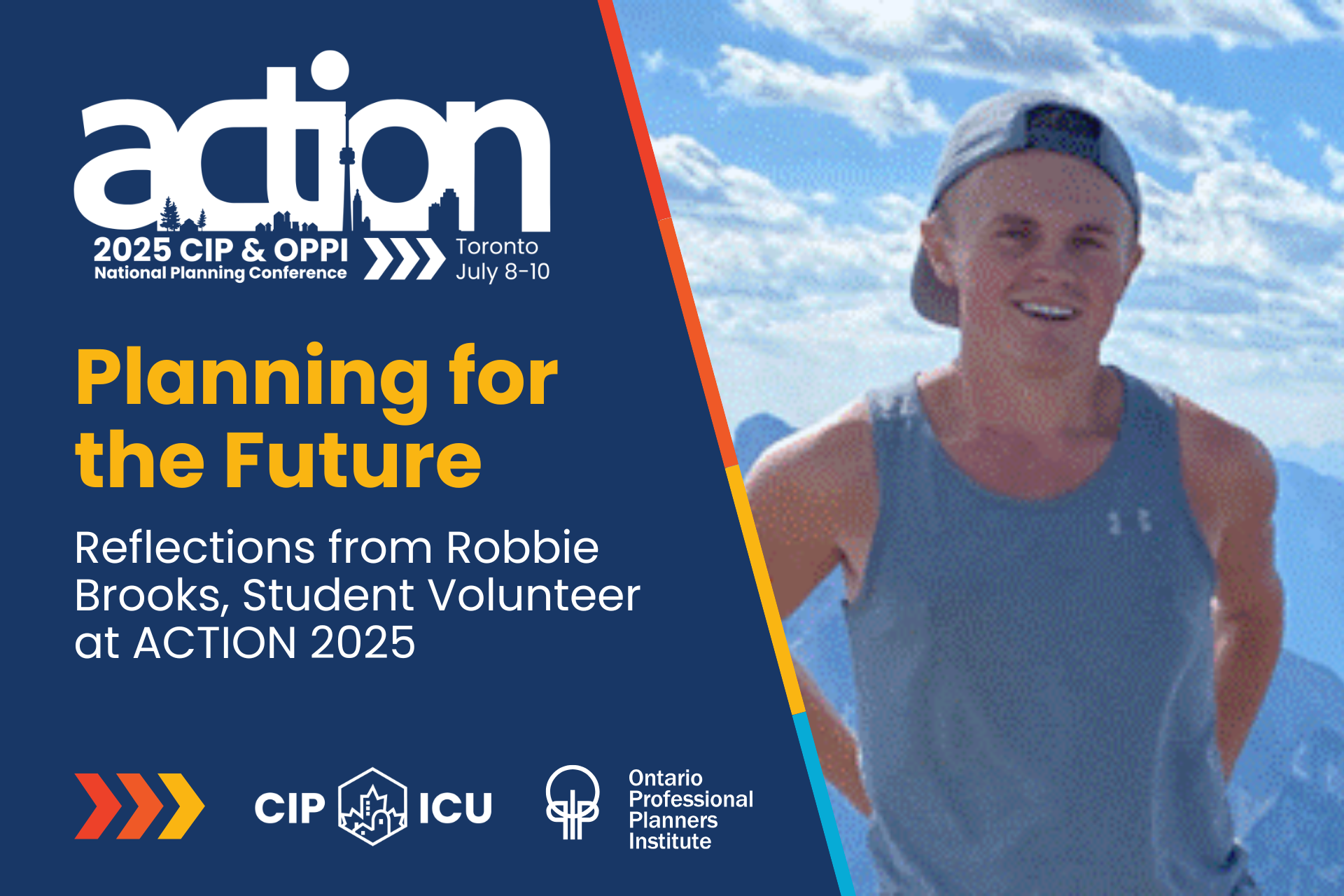From July 8-10, 2025, CIP and OPPI hosted ACTION 2025, the largest national planning conference in Canadian history, in Toronto. The conference would not have been a success without the support of our student volunteers.
In this Q&A, we catch up with Robbie Brooks, a recent graduate of the University of Alberta, who shares highlights from the conference, lessons learned, and advice for fellow planning students.
Can you tell us a bit about yourself and why you decided to study planning?
I graduated this past spring with a Master of Science in Urban & Regional Planning from the University of Alberta. My previous undergraduate degree was in Political Science and Geography, so those two fields synthesized nicely for my transition to grad school. I was always interested in planning ever since my late grandfather, who wrote the first official plan for BC Parks, would point out campgrounds he helped design. These days, I’m particularly interested in large-park planning, too, along with transportation infrastructure planning.
What motivated you to volunteer at ACTION 2025?
Volunteering at ACTION 2025 was a no-brainer after volunteering at last year’s national conference, CONNECTION 2025, in Edmonton (my home base)! For my second stint at this year’s event in Toronto, I felt like a seasoned pro and could confidently help guide both new recruits and conference attendees alike. If you’re a planning student considering volunteering, it really is an incredible opportunity to make new friends and professional connections in the planning world. There’s always a fascinating topic being discussed somewhere down the hall that might expose you to an area of planning you hadn’t considered before.
Was there a moment or session at the conference that really stood out to you?
It’s always hard to choose a particular “favourite moment” from such an action-packed few days, between the 7:00 a.m. networking breakfasts, social events, academic sessions, and countless laps running around the conference centre. This year’s conference was especially challenging because there were conflicting sessions that I wanted to attend. The morning keynote addresses are always a shot of motivation to start the day, and Maayan Ziv’s was no exception. She delivered an incredibly compelling case that shifted my own thinking on how planners can use their positions to help create a more accessible built world, as she said, “beyond ramps.”
What was your biggest takeaway from the conference?
As a returning student volunteer, one of my biggest takeaways was just what an impressive and passionate slate of people are graduating into the planning profession. If you spent any time at the student networking lunch, academic poster displays, or Meet and Mentor session, you spoke to students and recent graduates who not only knew their stuff but were bubbling with excitement to put recent academic experience into bettering their communities. It’s inspiring to think about the impact each of us might have in the years to come.
How has volunteering at the conference influenced your career goals?
It’s impossible to leave these conferences without a million “what ifs” on your mind after talking to planners from tiny hamlets to major urban centres across the country, about what gets them out of bed in the morning. I left with a refreshed passion for planning and a renewed sense of just how much our professional practice impacts people’s lives. On a more personal note, as a recent grad in the job market, I found myself more interested in exploring roles in smaller or rural communities, where a more diverse set of tasks and challenges may land on your desk.
Do you have any advice for other planning students considering volunteering at future conferences?
I’ll keep this brief: do it! There is no better opportunity for current students and recent graduates to meet their peers from across the country, network with professionals from across the planning spectrum, and, if you’re a bit of a nerd like me, attend some really interesting academic sessions on a litany of topics. The social events and daily catering are a nice perk, too. Make sure to attend everything you can and make use of available resources like resume reviews, professional headshots, and mentoring sessions; those three days really fly by.
Is there anything else you’d like to share with CIP members?
I would be remiss if I didn’t thank my fellow student volunteers and the entire CIP staff team. We really were one big happy family for a few days. I’d also like to thank all of the CIP members who took the time to personally thank us for volunteering and keeping sessions running smoothly.
I hope to see everyone again next year in Montreal, particularly at the annual Max Bacon 5K (I know the 7:00 a.m. start time is painful, but you’ll never regret a run!)
Want to get more involved in the planning community?
Join CIP as a student member for free! As a student member, you’ll gain access to volunteer and networking opportunities, events, and the latest planning news to help you grow your career from day one.

About the Author
Robbie Brooks is a recent graduate with a Master of Science in Urban and Regional Planning from the University of Alberta. He lives in Vancouver, BC. When he’s not making maps and poring over zoning bylaws, he can be found skiing, paddleboarding, or trail running. As a recent graduate actively in the job market, he would greatly appreciate it if you added him on LinkedIn.
